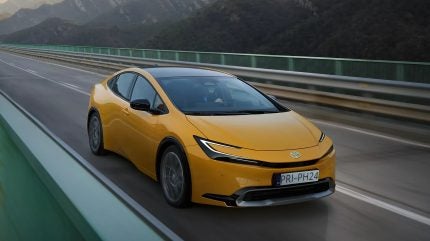
Toyota may be one of the slowest legacy automakers to develop electric vehicles but it could be the first to jettison cars powered only by petrol, according to a Reuters report.
Almost 30 years after launching the Prius, its pioneering petrol electric hybrid, Toyota was moving to convert most, and eventually maybe all, of its Toyota and Lexus ranges to hybrid-only models, two company executives told Reuters.

Discover B2B Marketing That Performs
Combine business intelligence and editorial excellence to reach engaged professionals across 36 leading media platforms.
Chairman Akio Toyoda said in January he believed the global share of EVs would top out at just 30% so the automaker instead touted a “multi-pathway” strategy that included EVs along with hybrids, hydrogen fuel cell vehicles, green fuels and, potentially, other technology yet to emerge.
“Going forward, we plan to evaluate, car line by car line, whether going all hybrid makes sense,” David Christ, head of sales and marketing for Toyota in North America, told Reuters.
Toyota chief sees 30% share ceiling for BEVs
Those evaluations would come with every model redesign, if not sooner, the report said, and included the pending redesign of the RAV4 for the 2026 model year. The RAV4, America’s best-selling SUV, already had hybrid variants which account for about half of sales.
Two Reuters sources familiar with Toyota’s product planning discussions said the automaker was highly likely to ditch the petrol only version for North America but hasn’t made a final decision.
That decision, however, had already been taken in other markets such as the UK and Australia where the RAV4 now is offered only as a hybrid or plug in hybrid.
Reuters said the automaker had already stopped offering a petrol only version of its Camry, America’s best selling sedan, for the 2025 model year while its Land Cruiser and the Sienna minivan, for example, also now come only as hybrids.
Many of the hybrid only models will also likely come as a plug in hybrid with a bigger battery, according to the Reuters sources.
Toyota’s effort to convert all or almost all of its North American model line to hybrid only vehicles had not previously been reported, the news agency noted.
Reuters said the automaker’s hybrid strategy aimed to solidify its already dominant position in a part of the market which had found a new lease on life as demand for EVs slowed, partly due to their high prices and charging issues.
Apart from two EVs and a fuel cell car on sale in North America, there were currently 31 other Toyota and Lexus models. Eight were already hybrid only and eight available in petrol versions only, Reuters said.
Toyota executives and industry experts told the news agency the hybrid strategy would also give Toyota unique advantages in complying with increasingly tough US carbon emissions restrictions.
As the US lowers pollution limits under regulations announced in March, Toyota’s booming hybrid sales could help the automaker save billions of dollars in regulatory fines and costs while buying it more time to develop EVs or other zero emission vehicles.
The new emissions standards take effect from the 2027 model year and run through 2032.
Christ told Reuters Toyota hadn’t set a deadline for producing an all hybrid lineup while certain models, such as pickups and economy cars, might take longer because of consumer price sensitivity on entry level versions.
Last May, Reuters noted, the automaker showed off a small prototype combustion engines it said could one day run on biofuels or low carbon synthetic petrol and could be paired with hybrid drivetrains.
But the main point of scaling down the engine size, according to one of the two Reuters sources familiar with Toyota’s product planning, was to allow it to develop hybrids in a different way. Instead of starting with a petrol car and adding a battery, it planned to start with its new EV platform and add the tiny engines to create a more efficient hybrid option.
According to one of those two sources, the first hybrid based on the new platform and engine would likely be a Corolla plug in hybrid likely to go on sale in China in 2026 and the United States in 2027.
Reuters noted Toyota’s hybrid boom owed to decades of investments in bringing down the cost and boosting the efficiency and performance of its petrol electric powertrains and the technology for a traditional hybrid now typically added less than US$2,000 to a car’s retail price.
In addition, while early hybrids were slow, today’s models often offer more power than their petrol only variants.
Those advances eliminate the two biggest consumer concerns that for years made hybrids largely an automotive niche, accounting for less than 3% of all US sales as recently as 2019. Now they’re at 11.3% and rising, according to the Reuters report. Hybrids accounted for just 9% of Toyota sales in 2018 but 37% as of last June.
Christ told Reuters Toyota expected hybrid sales to keep accelerating. “Next year,” he said, “we definitely will be well over 50% of our total volume.”
Toyota’s US hybrid sales YTD 30 June rose 66% from last year to 438,845 vehicles, the company said, compared with EV sales of just 15,107.






